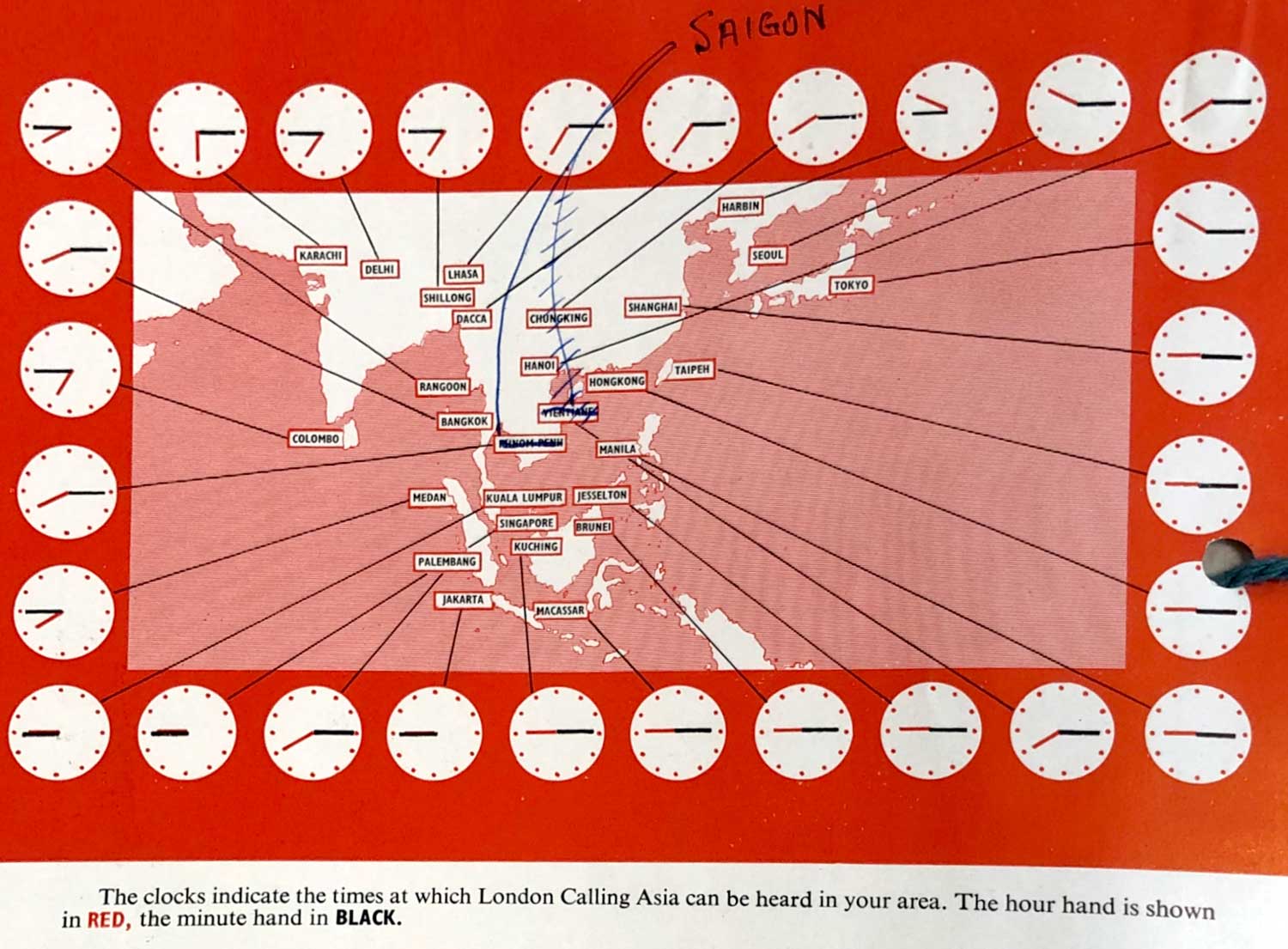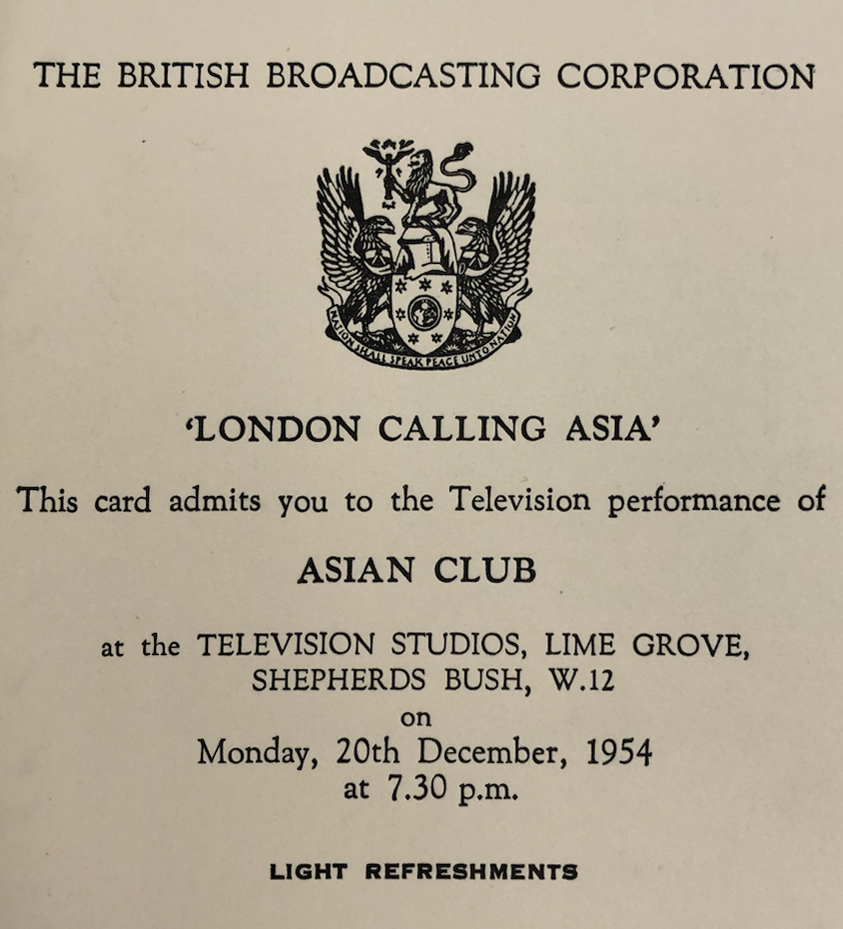London Calling Asia
- 1937— the BBC began planning a shortwave transmitting station to relay BBC Empire signals from the United Kingdom to the Far East
- 1946 —The British Far Eastern Broadcasting Service began broadcasting at Jurong transmitting live programmes in English, Burmese, Indonesian and Thai from studios at Singapore's Cathay Building on Thomson Rd.
- 1949 —These studios moved to Caldecott Hill. B.F.E.B.S. shared the site with Radio Malaya (Singapore). Operations consisted of live broadcasting in English, Indonesian and Siamese, news editing and monitoring.
- Christmas Day, 1949 —The station was again moved to Tebrau on the mainland of Malaya, and control of B.F.E.B. S. was handed over by the Foreign Office to the BBC.
- 13 May 1951 - Inaugural broadcast of London Calling Asia
- August 1965 — BBC Far Eastern Service closed down its studio operations in Singapore. It became the BBC Far Eastern Relay Station in 1974, and it is still on the air.

London Calling Asia, (LCA) was a programme in English for South and South East Asia and the Far East. It was produced by the BBC’s Far Eastern Service and had its first broadcast on 13 May 1951 as a recorded transmission. The service transmitted daily between 13.15 and 14.00 GMT to South and South-East Asia and the Far East as a complement to English language programmes already being broadcast to these territories by the BBC's General Overseas Service. LCA was the maiden broadcast of the new and more powerful relay stations installed by the British Far Eastern broadcasting service in the U.K. and Singapore.
LCA was conceived by Director General of the Overseas Service of the BBC, Major General Sir Ian Jacob and John Morris Head of the BBC’s Far Eastern Service. LCA’s programme aims were to "reflect ideas and activities of people in Britain" and will include cultural, scientific, and current affairs talks and discussions.” It was hoped that “Asian friendship for Britain will be fostered by this.”
In the Inaugural broadcast of the LCA, Sir Ian Jacobs says that the LCA will be composed of items of particular interest to those inhabitants of Asia who understand English, and will thus serve a special need which the General Service cannot meet.

The goal of the programme was to “.. build a strong link of friendship and understanding between the people of Britain and the people in the Asian countries who can hear the program. It was also hoped that
“It will also help to link the peoples of the various Asian countries to each other because, before long we shall arrange radio exchange programs between speakers of different Asian centres.”
The new program was not to include any news as there was already a world news bulletin everyday at 1300 GMT in the General Overseas Service (15 minutes before LCA started.)
According to Jacobs:
“the BBC tries in its programs to reflect the ideas and activities of people in Britain and stimulate understanding between the people of Britain and the people of distant lands. We therefore intend to try and interpret to our friends in Asia, the various trends of British policy and thought on current affairs and to project the different aspects of life in Britain today.
We shall give you reviews of the British press and commentaries on international affairs. We shall give you a weekly review of material relating to Asian affairs which have been published or broadcast in Britain.
We shall bring representative men and women in Britain to the microphone to give their views on a wide variety of subjects, including literary and scientific topics and accounts of important events in the social, academic and cultural life of Britain. “
The LCA thought up of few ways to draw in speakers and audiences from Asia. One was the plan to broadcast commentaries about Asian affairs recorded in the studios of the various national broadcasting organizations of the Asian countries as well as doing radio exchange programs between speakers of different Asian centres. The LCA was also keen to create “Audience Reports” in order to promote “.. a two-way flow of ideas and opinions and receive the views of our listeners.” The LCA had installed an Asian listening panel in order to distribute and collate answers to questionnaires that the LCA would send out. The BBC Written Archives at Caversham has several surviving samples of these LCA Audience reports.
The LCA seemed to have flourished for several years but became more and more indistinguishable from the other programmes produced by the GOS. Interestingly, in a memo dated November, 1958, Acting Assistant Head of the Far Eastern Service, Sybil Hall, outlines the incorporation of London Calling Asia into the BBC’s General Overseas Service programming. Mr Hall describes LCA as being a popular part of the BBC’s “Eastern and Far Eastern Service, not only with Asian but also with many other listeners living in Asia” but proceeds to announce the incorporation.
